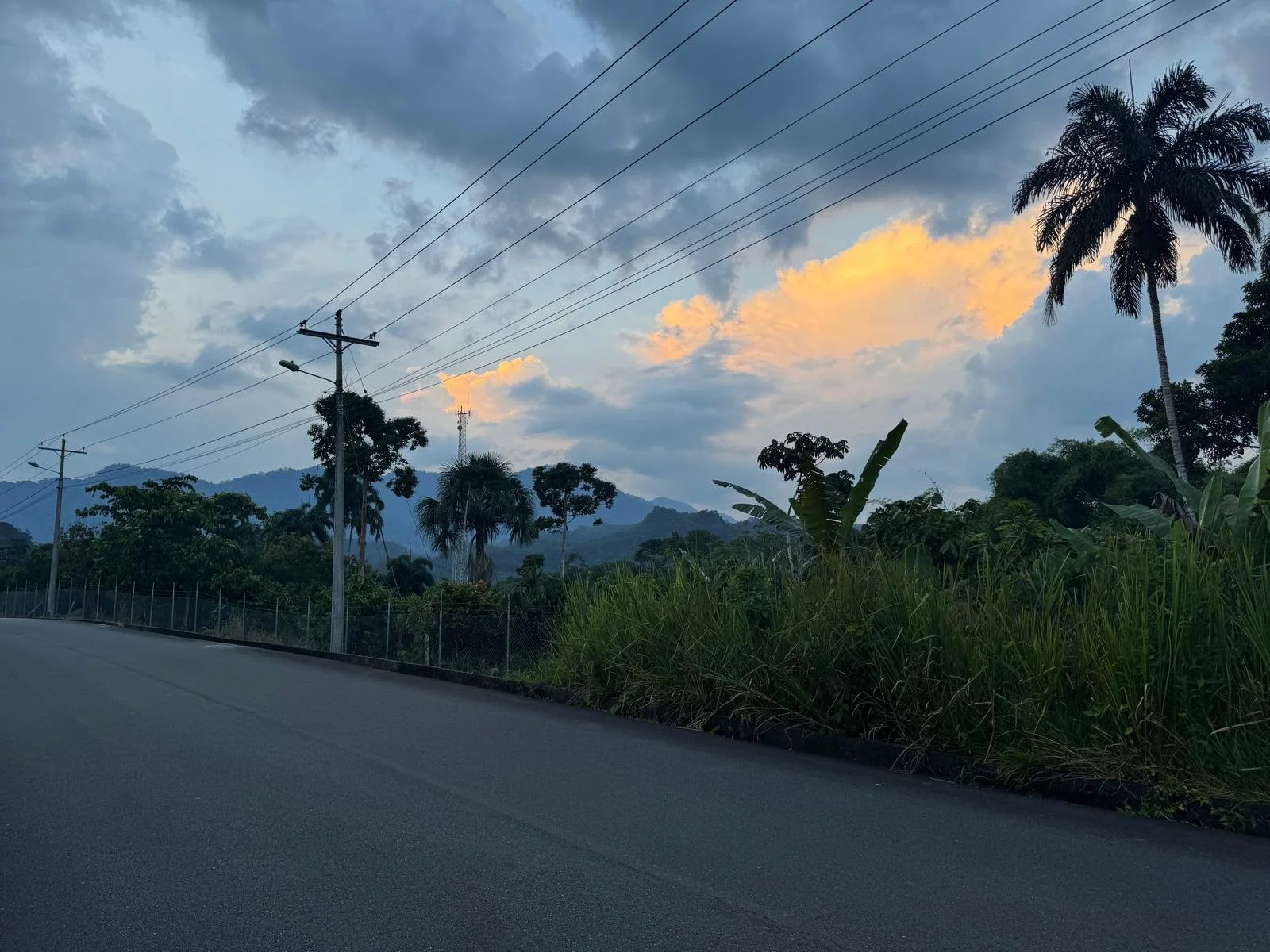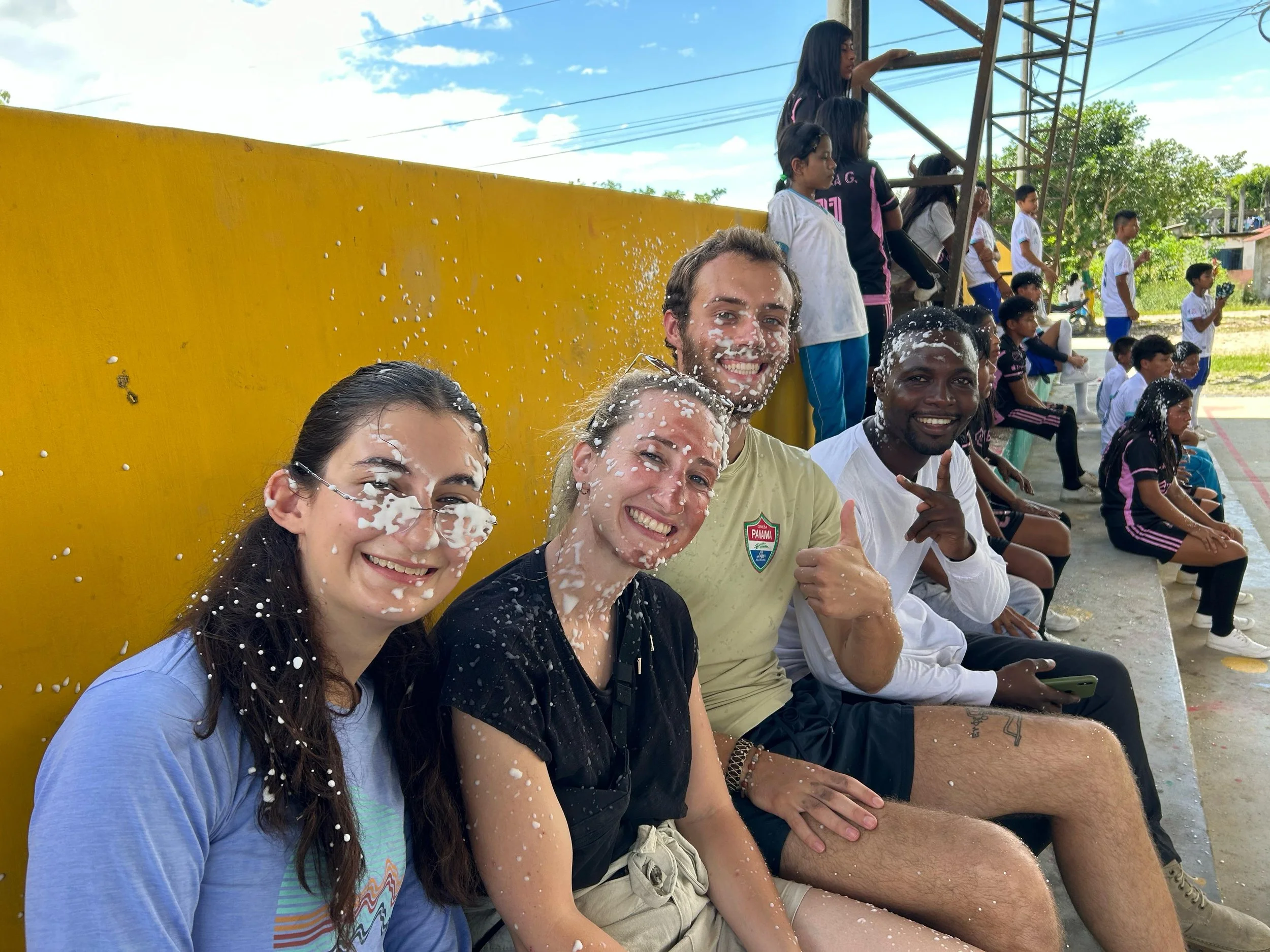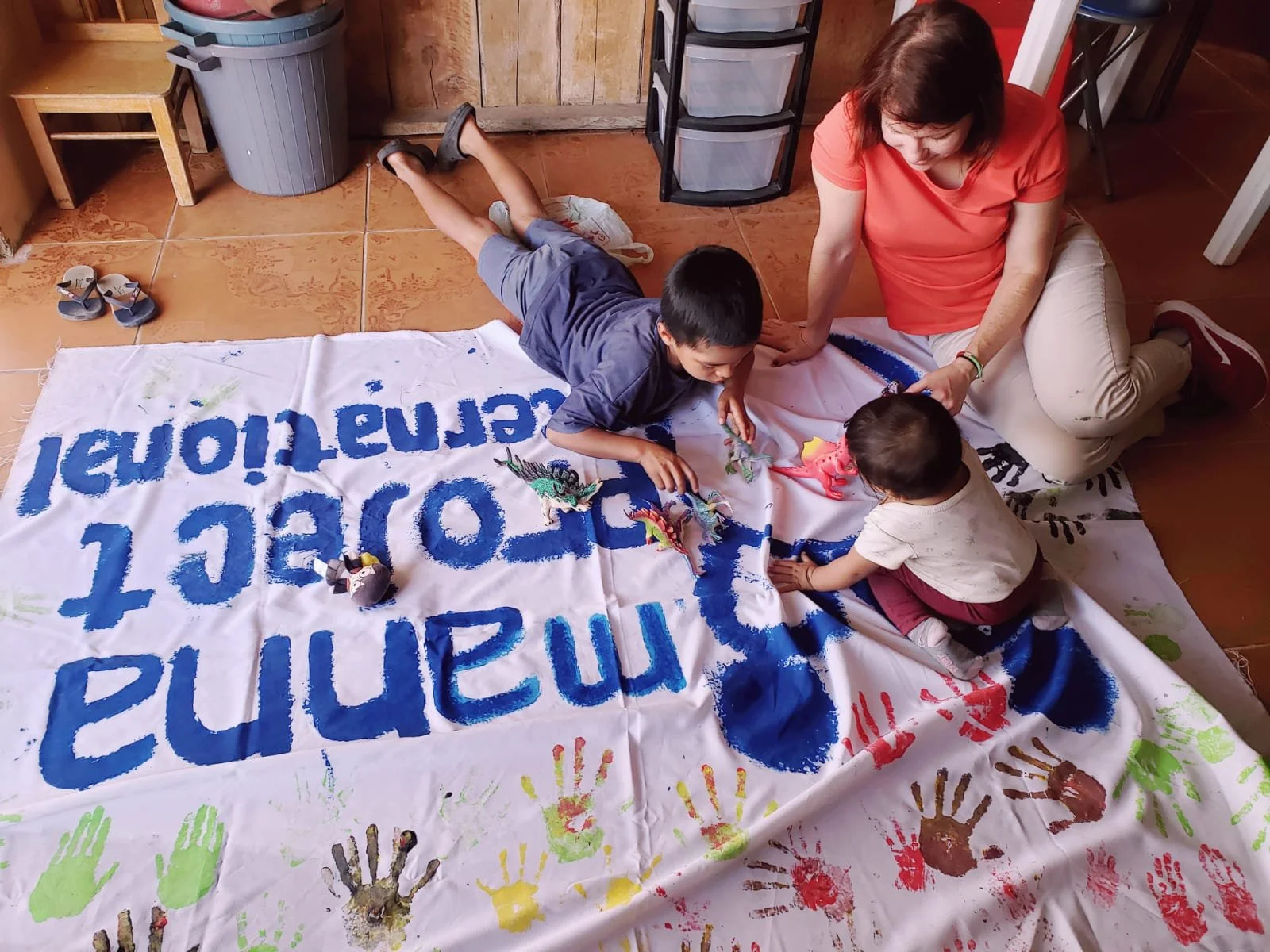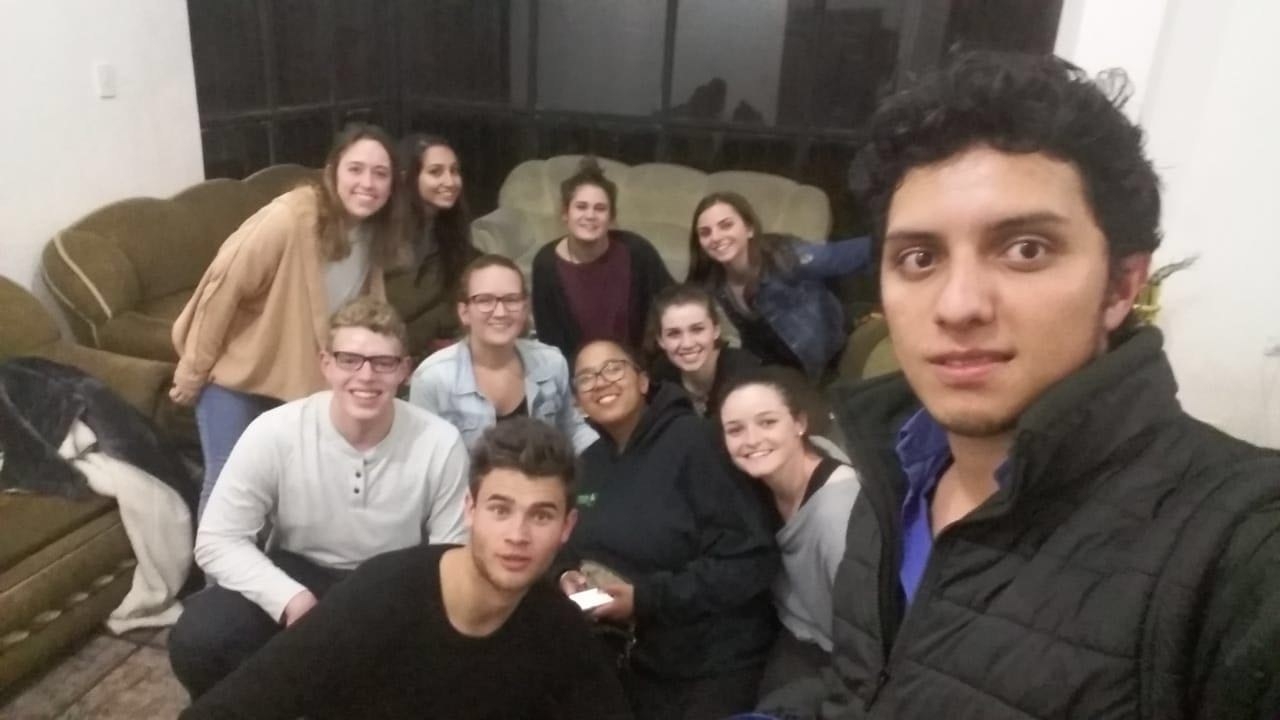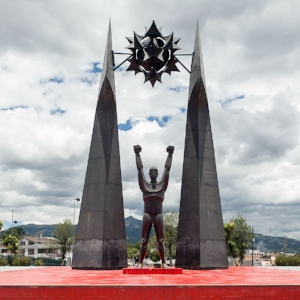Growing up in Maryland, I played soccer until around middle school, when I realized I wasn’t all that good at it and that I was in love with basketball instead. Since then, I’ve been known to kick the occasional ball around, but I was pretty nervous when I was invited, along with my friend and fellow PD Patrick, to play for Once Valientes B (in English: eleven brave ones) in the Shandia soccer league.
Music, Colors, Foods … and lots of Laughter - Carnaval in Shandia
As in many parts of the world, this past week in Shandia was all about the celebration of Carnaval. Originally coming from an area that calls the local Carnival the annual “fifth season”, I was especially excited to see what Carnaval in Ecuador would look like. What would the local customs, foods and music be like?
New Partners and a Life-Changing Experience: University of Findlay and Manna Project International
Written by: Chrysta Blechschmid
Serving abroad changes lives, but they change in unexpected ways. I believe while I am serving abroad, I am not changing lives, but rather they are changing mine. Though my personal experiences with Oilers Serving Abroad and Manna Project International, my life as a timid, young college freshman has transformed into a confident, mature graduate student looking for more growth opportunities and stepping out of my comfort zone in any way I can.
Oilers Serving Abroad (OSA) is a student lead service abroad organization at the University of Findlay. Our mission statement is: “To provide opportunities for Oilers of diverse disciplines to serve our global community, learn about culture, establish relationships, and enrich our lives.” Last spring break, OSA decided to expand our program and partner with Manna Project International in Ecuador. This expansion was exciting, but also nerve wrecking. Would this new program meet our expectations? The answer was YES!
Spring Break 2019 was our first official program and we are excited to continue the relationship with Manna Project. These opportunities to serve abroad in college are eye-opening experiences that some students would never have had otherwise. Sometimes students need to take their heads out of the textbooks and truly learn and appreciate diversity and culture. Traveling is the best way to do that. It’s the best way to breakdown stereotypes and barriers.
“Be the Change you want to see in the world” is a famous quote by Ghandi. Sometimes, the first step in being the change is experiencing change. Opening your mind and eyes to new experiences, new hardships, and new relationships is important. Manna Project International and their holistic approach to service, showed me and my group of students that service is so much more than donating money or doing physical labor. Service and Leadership have many definitions. Service can be as simple as a smile or a listening ear. Service can be investing in the local economy by visiting local markets, and all forms of service can be meaningful. We had the opportunity to volunteer at a local pre-school, a sustainable gardening project and a special needs school, while also volunteering at the community center in the afternoons. The diverse options for service helped expand our service definitions. But most importantly service requires relationships. Without people, there would be no one to serve and no one to do the serving. By listening to the community and creating a lasting relationship at the community center, Manna is making a difference, and I am proud to be a part of it.
The biggest eye-opening experience to me last week, was creating a new definition of leadership. The amazing Program Directors at Manna Ecuador, specifically Gaby and Kate, and the Ecuador Country Director, Deborah, helped us realize that leading does not mean having all the answers, but having a plan. It also means being flexible and positive if an activity does not go as planned. Being a leader is not about bossing people around, it’s all about listening and leading by example. I felt as a leader of Oilers Serving Abroad, my own definition of leadership was changed, and I will always appreciate Manna for helping me grow and expand my mind.
Manna Project International in Ecuador is an amazing program with diverse service learning and eye-opening experiences. It helps students change their perspectives. Most of my program consisted of graduate Physical Therapy or Occupational Therapy students, so teaching English classes or assisting in cooking classes and the general language barrier, was not exactly in our comfort zones. We knew that the Nicaragua Site was more medical based, but by choosing to volunteer with Manna in Ecuador, we pushed beyond our comfort zones and grew. This type of growth is vital for any major and any profession and will certainly help us as future healthcare professions.
Below are some testimonies:
Gaige Rassman, Graduate Student in the Doctorate of Physical Therapy Program.
“My time in Ecuador changed my whole perspective on service. It was easy to see that Manna Project International was not only making a change in the community, but one that is going to last. They focused on the holistic approach that addressed the needs of the community for all ages. Manna showed me: being passionate and giving voice to others can make a lasting impact on the world around us and ourselves”
Tabitha Hossler, Graduate Student in the Doctorate of Physical Therapy Program
1 Peter 4:10, “Each of you should use whatever gift you have received to serve others, as faithful stewards of God’s grace in its various forms”
Adrian Ewald, Graduate Student in the Doctorate of Physical Therapy Program.
“Manna Project International in Ecuador was an experience that shifted the way I look at service. Interactions between the staff and the community members shower me that we all work for each other and we can all learn from each other. From this experience I learned how patience, laughter, and friendship transforms lives…including my own”
Jenna Bullock, Graduate Student in the Doctorate of Physical Therapy Program.
““We live in a wonderful world that is full of beauty, charm and adventure. There is no end to the adventures we can have if only we seek them with our eyes open.” – Jawaharial Nehru
My week at Manna was an eye-opening experience. It taught me about a culture different than my own and it taught me that service is more than hard labor; its investing in a community, forming relationships, and meeting needs of the people you live with. Ecuador taught me so much about hospitality as it welcomed me with open arms. I have learned so much from this experience, and I am forever grateful to Manna for the opportunity to partner with them and learn more about the world I live in.”
Gabi Lamb, Graduate Student in the Masters of Occupational Therapy Program.
“Even though I only got to spend my time with Manna for a week, I feel so connected to both the community members and those who help out at Manna. I love how Manna is a fun and safe environment for community members of all ages to come and learn from each other. The Ecuadorian culture is so welcoming and accepting of others and has challenged me to do the same here in the United States. This experience has led me to be more aware of other cultures I’m surrounded by and the endless ways that we can serve one another.”
Being part of the Oilers Serving Abroad family and expanding that family to Manna Project International was a great decision and I cannot wait for more students to get involved. Ecuador has a wonderful and welcoming culture that we can learn a lot from. I hope everyone gets the chance to go abroad and learn about another culture and learn about themselves along the way.
An Intern Experience in Ecuador
I left Chicago O’Hare to travel to Ecuador feeling extremely excited, but also with the knowledge that I would be taking each and every part of my trip as it came. A month before the trip, I had no inclination that I would be flying down to South America; I was initially accepted into the Manna Project International summer intern program in Nicaragua, but a series of violent protests sparked by pension law changes tossed a wrench into my plans. Manna operates two sites, one in Nicaragua and one in Ecuador; when it was announced that the Nicaragua site would be canceled for the first session, I worked with the Manna staff and my parents to shift my plans for Ecuador.
I wanted to work with Manna in any capacity because it offered several facets that aligned with my academic and personal passions. Most importantly, I am very interested in international community development, having studied it in courses at Vanderbilt such as Latin American Economic Development. Manna operates an effective approach to international community development by partnering with local organizations to provide a holistic development approach to community members. International development can be a difficult task laden with problematic approaches that resemble voluntourism, or the white-savior complex; Manna’s programs start by listening and getting to know the communities they serve, then aligning resources to meet the demonstrated needs. Manna offers the chance to have my feet on the ground, engaging and serving communities in Ecuador, while at the same time learning about a successful international development model.
Since arriving in Ecuador and experiencing the first week of service, I have already had done things very differently than my normal modus operandi back home. One big difference for me: riding the bus. Ecuador has a well-utilized bus system, and I am still nailing down the names of the different buses (Cia Azblan, Libertadores, Los Chillos, Amaguaña, etc.) and the different routes (Conocoto, Rumiloma, La Salle, El Triángulo). I learned that on each bus, rather than having an automated system like buses I am accustomed to in the U.S. there is an “ayudante”, a man or woman who comes up to each passenger and asks for the bus fare. The fare is typically anywhere from 25-35 cents, so I now carry much more change in coins than I ever have. An interesting facet of Ecuadorian bus culture that I have begun to practice myself: although Ecuadorians tend to be very welcoming people, they remove to move from aisle seats to window seats on buses. Any on-boarding bus passenger who spots an open seat is forced to squeeze past the aisle seat passenger, whereas in the U.S. typically the person would just move over. After having squeezed uncomfortably passed a number of people, I myself have started occupying the aisle seat and insisting that people budge past me.
Another hallmark experience from my first week was a community “almuerzo” [lunch] that I was invited to alongside our program directors. One of the women in the level 2 English class beckoned us to come to her family’s house for Ceviche, a traditionally prepared coastal Ecuadorian dish. When we got there, we had a long chat with her husband, who is a serviceman in the Ecuadorian military. Then, we sat down to Ceviche. It was a cold fish soup, prepared with shrimp, tomatoes, lemon juice, cilantro, and a few other ingredients. As is often custom, there were bowls of tostada, popcorn, and chifles [plantain chips], and we were instructed to add some of these other items to the soup. My first bowl was good; I enjoyed pairing the warm tostada with the cold, zesty shrimp soup, and I ate the whole bowl. However, the texture was very different, and honestly I still don’t know how I feel about cold soup. She refilled my bowl and I struggled through the second helping, finishing it not out of a strong taste for the Ceviche, but to satisfy our gracious host.
Looking forward to the rest of the program, I hope to focus on 3 objectives: utilizing my Spanish, making a strong sustainable impact on the community and its programs, and forging strong relationships with the rest of my cohort. I have been listening to Spanish music and starting conversations with anyone who will talk with me, and I plan to prepare extensively for the English classes and other initiatives I am involved in so that I can contribute positively to Manna’s work. Finally, through bus rides and community dinners, I have already had a chance to form bonds with the other interns, and as we serve, learn, and experience Ecuador together, I know those bonds will only deepen and grow.
Learning about our Community
Having lived in Sangolquí for a year, I thought there were many things which were simply unknown. For example, I always wondered why this valley was called the Los Chillos Valley. I asked and no one seemed to know the answer. While I know a great deal about our community currently, I never fully understood the history behind the area where we work. I finally got the answers I was looking for when community members (once known as my host parents) Christian and Laura came to the Library to give a short talk about the history and culture in Rumiloma, the community where our Library is located. All 10 of us crowded into the darkest room in the Library at 11:00 am, to watch a presentation from Christian. Not only was this talk informative and interesting, but it also helped Program Directors gain perspective on how important our work is here in the Los Chillos Valley. In order to make this post as interesting as the talk actually was, I wanted to provide key takeaways from the story of Rumiloma:
The larger valley where we live and work is called the Los Chillos Valley, named by the indigenous Mitmakunas who settled in this area in the early 1400’s. The Valley is located in a county known as Rumiñhaui, and Sangolquí is the largest city in this county. Within Sangolquí, there are many neighborhoods. One of these is Rumiloma, where we work on a daily basis!
The County of Rumiñahui is one of the Smallest in Ecuador! It gained its independence in the month of May and has a large celebration each year. It is also surrounded on all sides by the county of Quito!
Rumiloma used to be made up of only 6 families! An area which is now known as being semi-urban with houses occupying almost every block was once all farmland. This farmland was filled with large Haciendas. After wealthy families owned Haciendas, many were ousted from their land for not paying taxes, and the land was then parceled out to community members at a cheap price. The area has grown significantly since this time and now boasts over 100 families.
Rumiloma is known as “a town where people come to sleep” because it is so close to the capital city of Quito. Most individuals work in Quito and Rumiloma is a commuter town. Therefore, during the day the town is filled with kids and mothers, while fathers and women of working age are in Quito working. This is a major reason why so many of our programs at Manna over time have been geared towards Women and Children!
Oswaldo Guayasamin, the famous painter was born in Sangolqui! Although he did not technically live in the Rumiloma area, he was born in the same valley and town where we work. He even created a famous statue to honor his hometown.
The Rumiñahui statue designed and constructed by Oswaldo Guayasamin located in downtown Sangolquí.
After the presentation, we had a question and answer session with Christian and Laura, who have spent a great deal of time living in and researching about this community. Program Directors asked why community members had such an interest in English and what were other community needs here, and received answers that will help shape our programs for the future. This talk not only taught Program Directors about the community where they are working but also explained more about Ecuadorian culture at an early stage in their time here in Ecuador.
To learn more about a new culture and be able to have in-depth discussions with community members about their lives and experiences, apply to be a Program Director today!

